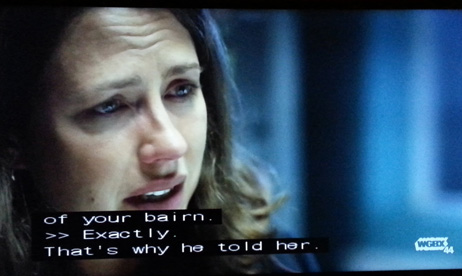 I watch a great many British television series on PBS, the Public Broadcasting system. Our local stations here in the Boston area are WGBH and their affiliated station WGBX. The scene below is from the police procedural "Vera", whose main character is DCI Vera Stanhope, played by actress Brenda Blethyn. Aficionados of this genre will know that "DCI" stands for "Detective Chief Inspector". Note 2  You may note above that I've turned on my TV's closed captioning system, to display the dialog in written words.Note 3 And on the top line, you'll see the word "bairn". This is not a word that I have ever heard used in the United States, but I've now heard it in British television shows many times. The first time I heard it, I looked it up - it simply means "child". My Barnhart Concise Dictionary of Etymology says: Note 4
Most Americans are familiar with the most common words that differ between American and British vocabularies. Here are just a few:
I thought it might be fun to list some of the other words I had to look up while watching just a couple of British television shows. I don't normally turn on closed captioning when watching American TV, but I do so when watching British shows. This is partly because some of the regional British accents depicted can be a bit difficult to decipher. Although most of these shows take place in England, some of the characters are Scottish, and Scottish accents and slang can be the most difficult to understand. Note 5 In addition to the regional accents, I also use closed-captioning because I run into unfamiliar words. In the list below, where I note the source of my information as "Google", I looked up the word or phrase on the Google search engine, and it returned a definition at the top of its search results. Unfortunately, these definitions sometimes don't cite a source. My list: From the same episode of Vera discussed above: Out on a jolly: One dictionary says it's British for "having a good time", but in the context of the show, it referred to a tryst. Who groused me out?: From context, it meant "Who betrayed me?" Is this a wind-up?: The Urban Dictionary says, "A deceptive or provocative act." (The "wind" rhymes with "find".) Swanning off: Google: To "swan around" or "swan off" is to go and have fun, rather than to work or take care of your responsibilities. I ran into even more slang in the British series "New Tricks": Pegged out: Google: Died On one's uppers: Destitute, poor. From Wiktionary: From uppers, the top part of a leather shoe, having worn through the sole. Plummy: Google: Having an accent thought typical of the English upper classes. Bedsit: Google: A one-room apartment typically consisting of a combined bedroom and sitting room with cooking facilities. Doddle: Google: a very easy task. Bung: Heard in the sentence, "I promised I'd bung the girl a few grand." Per the Urban Dictionary, British slang for a bribe, a "deal sweetener" of sorts. A mug's game: Google: An activity in which it is foolish to engage because it is likely to be unsuccessful or dangerous. Numpty: Google: A stupid or ineffectual person. Up the duff: Urban Dictionary: pregnant. Here are some for which I never found definitions: I promised the lads nandos: I never did figure this one out. From Vera. Dumping in a mate: From context, turning a mate over to the law. From Vera. There's a Betty on the phone: Google: An attractive girl or woman, often assumed to be 1980s surfer slang. But in context, a woman on the telephone was referred to in this way. You can't know if a telephone caller is attractive. I also note that this is assumed to be of American origin, but I've never heard it. Perhaps it's similar to the use of "a Sheila" in Australian slang, to refer to any woman. From Vera. He was flash: This seemed to be used to mean "He was flashy", as I would say it. From New Tricks. irn-bru: In context, seemed to refer to a den of iniquity. Wikipedia says, "Irn-Bru ('iron brew') is a Scottish carbonated soft drink, often described as 'Scotland's other national drink' (after whisky)." What this has to do with a den of iniquity, I have no idea. From New Tricks.   Note 1: There is some debate over the attribution of this quote to Shaw. In the early days of the state of Israel, someone once defined it as "A country whose citizens are united by a common inability to speak Hebrew." [return to text] Note 2: The image captured from my television screen shows the actress Clare Kerrigan, playing the character of Gemma Makins, in episode 4 of season 4 of Vera, "Death of a Family Man". It was originally aired in May of 2014. [return to text] Note 3: "Closed captions" are not the same as subtitles. Subtitles generally translate to another language, and they attempt to get the idea of the dialog across without necessarily doing a literal translation. Closed captions, on the other hand, try to transcribe exactly what is being said. They can be displayed on most modern television sets. [return to text] Note 4: The Barnhart Concise Dictionary of Etymology, Robert K. Barnhart, 1995, HarperCollins Publishers, New York, NY, ISBN 0-06-270084-7. [return to text] Note 5:
For a hysterically funny take on the Scottish accent, see Robin Williams on golf, on YouTube. Note: Contains lots of obscenity. [return to text]
 |